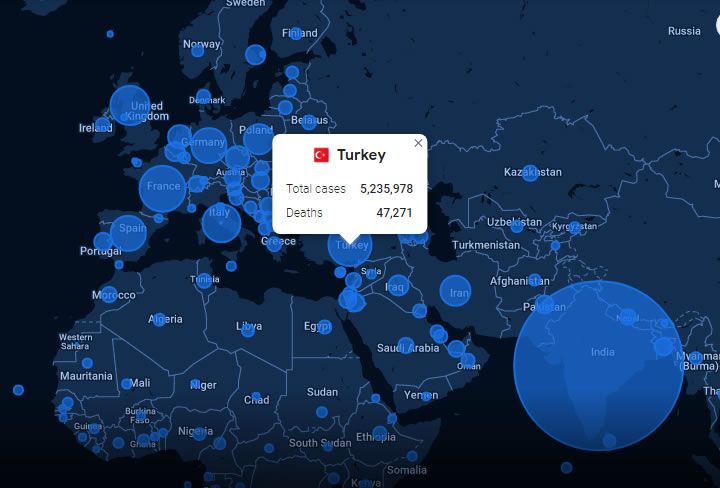THE GLOBAL EFFECT OF THE PANDEMIC AND THE EVALUATION OF THE TEXTILE SECTOR

Loss of life
The total number of cases worldwide (May 2021) is 170 million, the total death is 3.4 million, the total case in Turkey is 5.24 million and 47,405.
Unemployment
Millions of workers have applied for unemployment benefits provided by governments, while unemployment rates have increased by 3 to 15 percent worldwide, experts say it may take many years to return to pre-pandemic rates.
The applicants for unemployment benefits vary between 20% and 50% depending on the countries.
Stock Exchanges
The decline in stock markets, while the stock market fell in all countries in general, the shares of the pharmaceutical sector and health sector rose. While there is an economic contraction of 3-4% worldwide (the biggest contraction after the 1930s economic depression), it is predicted that there will be 6% growth in the recovery process.
Retail Sector & Consumer Confidence
Restrictions imposed due to Covid-19 caused an unprecedented decline in retail sales and store traffic. Customer traffic in retail stores decreased by 30 to 90 percent according to countries.
Studies show that especially those over a certain age are worried about going shopping even after their decision to open up. It is predicted that this type of indecision may continue for a few more years in the retail sector.
OTHER ARTICLES
- Advantages and Usage Areas of Culvitation of Hemp
- The Place of Hemp in Yarn and Textile Industry
- The Place of Hemp in Yarn and Textile Industry
- What is Linen and Linen Production in Turkey
- Sustainability in The Textile Industry
- Tthe Global Effect of The Pandemic and Tthe Evaluation of The Textile Sector
- Naturel Fibers and Organic Yarn Production
- Hemp Production in Turkey, A Historical Brief and Global Hemp Market
- European Flax Certificate
- Search for Sustainable Production in Textile Raw Material and the Hemp Yarn
- Linen and Hemp's Simila and Different Aspects
- Hemp Fiber and Fabric Production
- Ecological Hemp Production
- Sustainability Studies in the Textile Industry - 2021
- What is Needed for Sustainability in the Textile Industry ?
- Organic Yarn Demand Increases As Textile Raw Material Crisis Escalates
- 2021 Data and 2022 Expectations for Ready-made Clothing Industry and Textile Raw Materials
- Fiber and Hemp Yarn Production and Yarn Export in the Turkish Textile Industry
Expectations:
In April 2020, when the crisis was felt intensely, the Industrial Capacity Utilization Ratio decreased to 61.6%, the industrial production decreased by 31.4%, the prohibition of activities in the context of measures taken in many fields of activity in the services sector, transportation, tourism, restaurants, etc. Considering that demand in many sectors has almost come to a standstill, it is clear that it will lead to a worse picture with its results in the second quarter.
The experienced crisis created both supply and demand shocks, and its effect on inflation will be determined by the development of exchange rates, oil, commodity and intermediate goods prices.
Another negative effect of the Covid-19 crisis on the Turkish economy is that while tax revenues fell due to the recession, government expenditures increased the budget deficit due to the increase in social expenditures.
The fact that the deficit, which was 123 billion TL in 2019, reached 72.8 billion in the first four months of the year, is an indication of this.
As a result, the reflections of the global crisis, which occurred with the pandemic, on Turkey, are preparing a more negative picture for our economy, which is trying to recover during the 2018 crisis period.
The recovery after the pandemic will take a long time due to the foreign exchange requirement, exchange rate pressure, decreasing demand, unemployment, etc. arising from the external debt stock. In particular, the inability to reduce the current account deficit, external debts and the need for foreign exchange hinder investments, but there is no other solution for rapid recovery than structural reforms, employment and production increase.
Evaluation of the Pandemic Impact on the Textile Industry:
Turkey is the 5th largest textile supplier in the world, with more than 1.5 million qualified textile workers, Turkey aims to export 30 billion dollars with the 2021 ready-to-wear sector.
Ahmet Özsüz, President of the Turkish Textile Raw Materials Exporters Association, hopes to lay the groundwork in the post-Covid era by establishing lucrative partnerships with the Turkish textile industry, world-renowned brands and textile companies. , says.
Globally, the rapid decline in the Textile and related fashion sector as a result of worldwide clothing and household goods retail sales, increasing unemployment and decreasing disposable incomes brought order cancellations in the 1st and 2nd quarters due to the shortage of raw materials, factories operating at 60% capacity, textile machinery has led to reduced investment, with supply largely from China facing unprecedented disruption and shutdown. A combination of all the macro-economic issues mentioned above, along with more specific factors such as the suspension of transport and changes in demand patterns, has taken a toll on the manufacturing industry. However, the post-pandemic development is dependent on the recovery of China, which has the largest textile machinery park. China also ranks first in textile machinery exports with a 35% share. It is observed that India has serious investments in textile production tracks for the post-pandemic period, some textile production activities in Turkey were exempted from closure, production continued, but it is clear that both track increase, equipment investment and employment-increasing investments and activities to increase production potential are required.
Sources :
bbc.com/turkce/haberler-dunya-53249686
Paraanaliz.com,
oecd.org/coronavirus/en/#data
Hazine Bakanlığı, Ticaret Bakanlığı, TCMB, TUIK
ITHIB
Google News








Filofibra Pazarlama A.Ş.
FILOFIBRA Pazarlama A.Ş. has been providing service to Turkish Textile market in the sale of fiber, yarn and fabric in Istanbul since 1986.
Address
-
Filofibra Pazarlama A.Ş
-
Levent Cad. Sülün Sok. No: 34 1. Levent, Istanbul
-
Tel : +90 212 283 3860/ 9 Hat
-
Fax : +90 212 283 3859
-
Email - This email address is being protected from spambots. You need JavaScript enabled to view it.
Address Abroad
-
Filofibra SA
-
Riva Caccia 1 / A Central Park Bldg. 6900 Lugano / Switzerland
-
Tel - +41 91 985 78 11
-
Fax - +41 91 985 78 08 - 09 - 10
-
Email - This email address is being protected from spambots. You need JavaScript enabled to view it.

